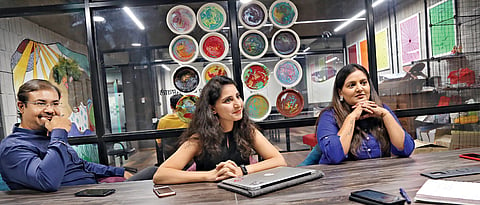

The Daftar in Baner has successfully broken all the notions of a routine workplace. It all started when two couples — Vandita and Abhishek Purohit and Sunanda Verma and Amit Bhatta — decided to come up with a coworking space with more focus on networking and community building, a space where monotonous workday will be replaced with fun and good vibes.
“We wanted to do something on our own. We would sit together, brainstorm and thrash out multiple ideas. Vandita was back from the US then. She had seen the startup culture and multiple coworking spaces there. She put up the concept of a shared office and we decided to explore it,” says Sunanda, who comes from marketing background.
The beginnings
But the kind of vibes they saw here and the picture that Vandita had portrayed of the work culture in the US weren’t really close. “So we thought of setting up our own office and working with different communities and startups. Startups are growing rapidly today and we really wanted to be a part of and also contribute to the ecosystem,” Sunanda adds.
They zeroed in on the first property they saw in Baner. “Setting up something like this involves a long process like having a website, funding, resources, networks and so on. It is like a one-man army but we do try to provide all of these in our best capacity. The connect and the collaboration helps freelancers and startups to come together and as a result, they grow together,” she informs.
After setting up the first property, they got a good response — it was filled within three months. So they decided to take up the larger coworking space with 100 seats in Baner again in 2016 and since then it has been a journey filled with growth and learning. The Daftar in Krome Mall, Hadapsar, is the third property under their initiative. It can accommodate 300 plus seats. “When we were working in our first property, we started understanding how things work in the US and here, and how easy it is to work and ask help there and so on. We wanted to get that culture in India as we spend half of our life at the workplace. We decided to make it in such a way that people would love to come to work everyday. That’s when we started working around the space, designs, idea and the experience to make it wonderful,” says Vandita who worked in the sales field earlier.
The challenges
“The concept we were working on — bridging the gap between different communities and bringing them together — was very new and people were really excited to collaborate with us. So that was not a challenge as such,” says Vandita, adding, “But one challenge we really had to tackle was the privacy issue, like people saying, ‘Oh, why is she looking at my laptop? What if she takes up my ideas?’ etc. Of course, with time, these things also settled down but initially going and telling them that a concept like this exists, asking them to connect; both inside and outside the community, required a lot of effort.”
Sunanda continues the same thread, “One more challenge we faced was that the startups with similar concepts wanted to work privately in different cubicles only. But we did not want such boundaries, we wanted transparency and a situation where anyone could approach anyone, anytime. We achieved that. After a while, we couldn’t see much difference among people in the working space. It is just a matter of time for things to settle down.”
The design
The Daftar in Krome Mall has everything that one is looking for in an unconventional office. If one takes a tour of their workspace, one will find a breakout zone or the recreation zone, the phone booths for those who want to talk in privacy, event zones used for training and exhibition, portable libraries, khamosh or silence room which can be used for brainstorming or for taking rest. Then there is Daftar box, also known as mini cabins, and finally, there are conference halls known as Badi baithak and Chhoti baithak.
Vandita, who designed this space, says, “Unlike the infrastructural space, the designing took time here. It wasn’t done in one shot. Once you start using the space, you start getting different and original ideas. We even involved the community so that they had a sense of belonging to the space and break out from slogging around. We realised that designs evolve with time and that gives a different feel to the workspace and also to the people.”
The response
The response to the concept has been amazing, the founders say in unison. “We are banking upon the fact that we are growing primarily through word-of-mouth feedback rather than other marketing activities. It has helped us to expand and build the community that we have today and be more accessible to everyone,” says Vandita.
People who have moved out, still call them, just to be in touch and that is how the Daftarites contribute to making the community stronger and bigger. Says Amit, “On an average, we have people working with us for 542 days. People who come from the same domain, see each other as competition but over a period of time, they collaborate with each other by understanding each other’s strengths. They see themselves as mutually dependent people who can form something together and come up with different things despite being in the same field.”
Amit also informs that a lot of research has been happening around the expansion aspect. “We have lots of professional inputs to study the market and see the scope for us to grow in different cities,” he concludes.
